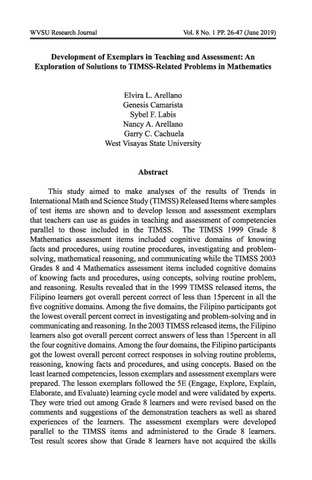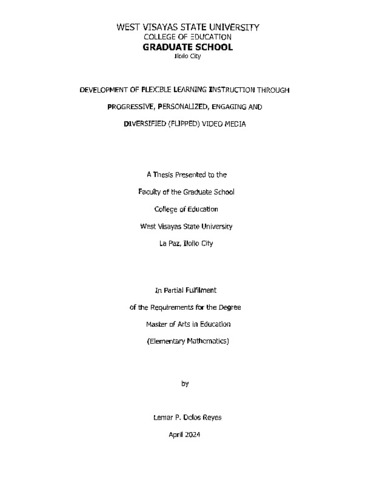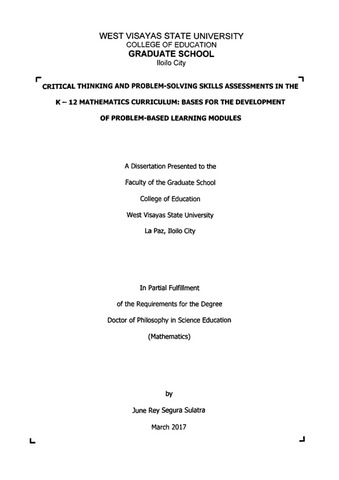Development of exemplars in teaching and assessment: An exploration of solutions to TIMSS-related problems in Mathematics
Date
2019-06Metadata
Show full item recordShare
Abstract
This study aimed to make analyses of the results of Trends in International Math and Science Study (TIMSS) Released Items where samples of test items are shown and to develop lesson and assessment exemplars that teachers can use as guides in teaching and assessment of competencies parallel to those included in the TIMSS. The TIMSS 1999 Grade 8 Mathematics assessment items included cognitive domains of knowing facts and procedures, using routine procedures, investigating and problem solving, mathematical reasoning, and communicating while the TIMSS 2003 Grades 8 and 4 Mathematics assessment items included cognitive domains of knowing facts and procedures, using concepts, solving routine problem, and reasoning. Results revealed that in the 1999 TIMSS released items, the Filipino learners got overall percent correct of less than 15 percent in all the five cognitive domains. Among the five domains, the Filipino participants got the lowest overall percent correct in investigating and problem-solving and in communicating and reasoning. In the 2003 TIMSS released items, the Filipino learners also got overall percent correct answers of less than 15 percent in all the four cognitive domains. Among the four domains, the Filipino participants got the lowest overall percent correct responses in solving routine problems, reasoning, knowing facts and procedures, and using concepts. Based on the least learned competencies, lesson exemplars and assessment exemplars were prepared. The lesson exemplars followed the 5 E (Engage, Explore, Explain, Elaborate, and Evaluate) learning cycle model and were validated by experts. They were tried out among Grade 8 learners and were revised based on the comments and suggestions of the demonstration teachers as well as shared experiences of the learners. The assessment exemplars were developed parallel to the TIMSS items and administered to the Grade 8 learners. Test result scores show that Grade 8 learners have not acquired the skills and competencies included in the TIMSS. Results discussed here may use teachers to improve and inform pedagogy and assessments develop inquiry skills among students. Teachers may also try using the less on exemplars as a guide considering the 5 E learning cycle model has shown by research to positively affect students’ achievement. Analyses of the items may help the teachers to design instruction and assessments that may expose students to higher order thinking skills. Further, results show how mathematical concepts taught and how assessment items constructed to provide students the context and experiences to develop critical thinking and problem-solving skills.
Recommended Citation
Arellano, E. L., Camarista, G., Labis, S. F., Arellano, N. A., & Cachuela, G. C. (2019). Development of exemplars in teaching and assessment: An exploration of solutions to TIMSS-related problems in Mathematics.Type
ArticleISSN
2244-4335; 2651-6659Keywords
Assessment exemplars Grade 8 Filipino learners Mathematics competencies TIMSS results Lesson exemplars Trends in International Math and Science Study TIMSS knowing facts and procedures using concepts solving routine problem reasoning using routine procedures investigating and problem solving mathematical reasoning communicating 5E learning cycle model Engage, Explore, Explain, Elaborate, and Evaluate Engage, Explore, Explain, Elaborate, and Evaluate learning cycle model 1999 Grade 8 Mathematics Assessment 2003 Grade 8 Mathematics Assessment 2003 Grade 4 Mathematics Assessment 5E model of Science instruction Engage Explain Elaboration Evaluation Algebra Geometry Statistics
Subject
Collections
Related items
Showing items related by title, author, creator and subject.
-
Gamifying formative assessment through Quizizz and Mathematics performance in modular distance learning
Maglasang, Yoln E. (West Visayas State University, 2022-05)This research aimed to investigate the effect of gamifying formative assessment on students' performance in modular distance learning. Specifically, it aimed to examine the effectiveness of gamifying formative assessment ... -
Development of Flexible Learning Instruction through Progressive, Personalized, Engaging and Diversified (FLIPPED) video media
Delos Reyes, Lemar P. (West Visayas State University, 2024-04)In the conducted Competency-Based Assessment Tool (CBAT) in Mathematics among Grade 5 learners, results revealed that there are competencies that learners failed to master, prompting the researcher to develop instructional ... -
Critical thinking and problem-solving skills assessments in the K-12 mathematics curriculum: Bases for the development of problem-based learning modules
Sulatra, June Rey S. (West Visayas State University, 2017-03)This developmental research ascertained the levels of critical thinking and problem-solving skills of students under the K-12 Curriculum, particularly in Patterns and on of Algebra. This study also determined the content ...





